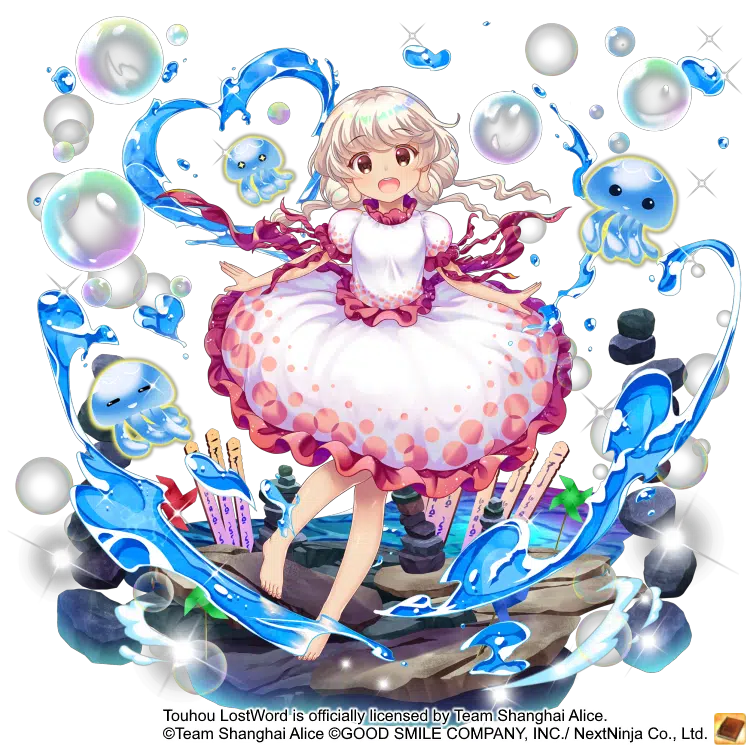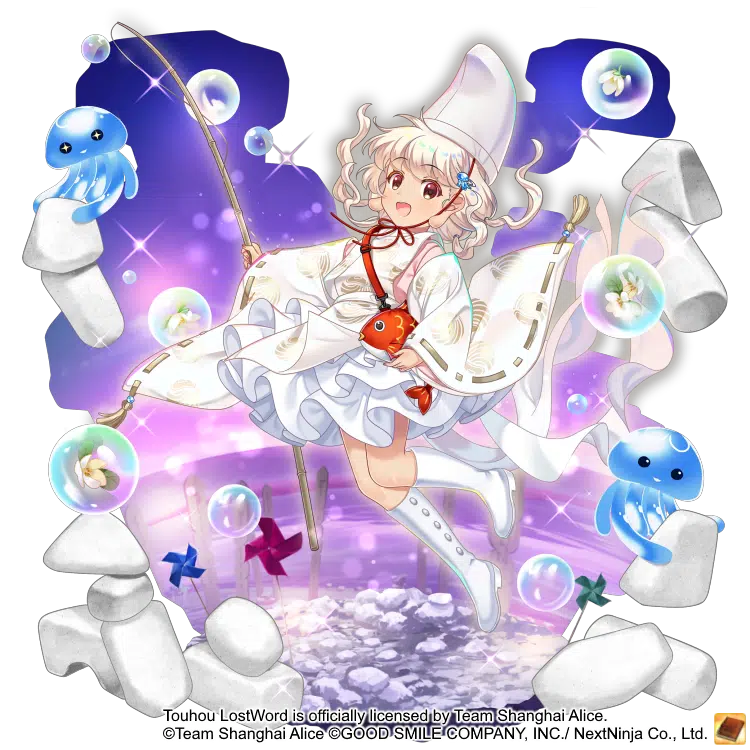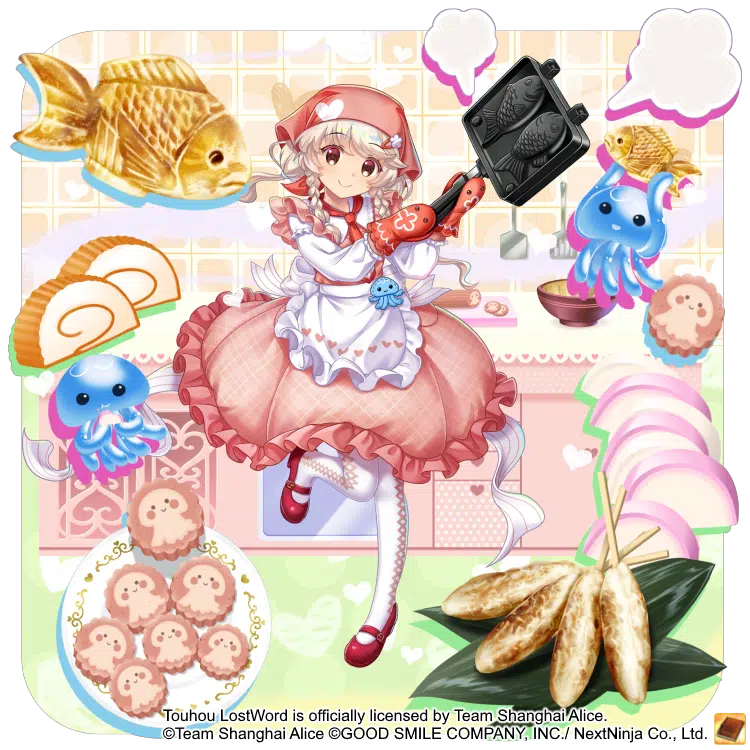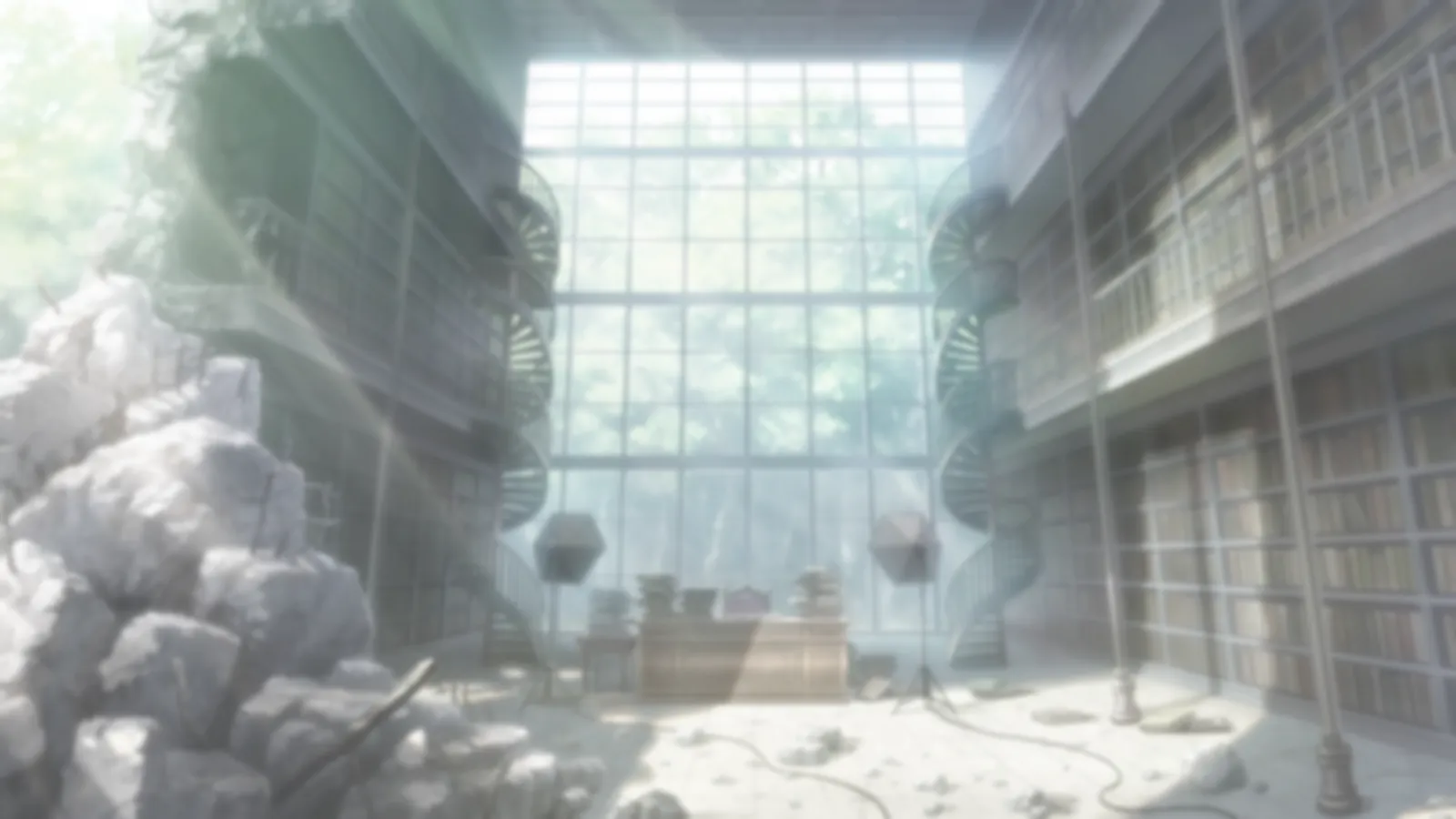Eika Ebisu
Stillborn Idol of the Riverbed
Eika Ebisu's usual outfit. She's wearing a white dress embellished with red ribbons and spots.
White Stone-Stacking Champion
Eika's Fantasy Rebirth outfit. It was fashioned at Kourindou based on information in the journal.
Ebisu Praying for Kids' Good Health
Eika's cooking outfit. "If you knock over my stones, I'll put YOU in a sandwich!"
Stillborn Idol of the Riverbed



Eika Ebisu's usual outfit. She's wearing a white dress embellished with red ribbons and spots.
Voice Lines
Voice Sets
Stillborn Spirits' Leader
VA: Yuri Yamaoka
Stone-Stacking Queen
VA: Kubo Yurika
Riverbed Idol
VA: Aida Rikako
Character Information
Temperament: Ishi no Ame
Ability/Backstory: Capable of stacking stones well
Attacks
Sea Moon
Eika Ebisu's Spread Shot (a Touhou LW original). Stillborn spirits attack her opponent. Jellyfish are free-swimming marine animals and are said to be embodiments of Ebisu, the god of voyages and the sea. However, it's said that Ebisu delivers blessings through objects that drift ashore, such as logs or even corpses, and this aspect of the god is represented by whales, not jellyfish.
Bullets
- Stillborn Crystal Jellyfish Spirit
- Stillborn Hairy Jellyfish Spirit
- Stillborn Aegina Rosea Spirit
- Stillborn Jewel Jellyfish Spirit
- Stillborn Flower Hat Jelly Spirit
- Stillborn Portuguese Man o' War Spirit
Stone Tower
Eika Ebisu's Focus Shot (a Touhou LW original). She stacks stones in this attack. According to ancient Buddhist teachings, a child dying before their parents is a sign of disloyalty. That child is thus not permitted to cross the Sanzu River and instead must continue to stack stones for their parents at Sai no Kawara. What's worse, oni are said to visit them and knock down any stone towers that are nearing completion. However, Eika and the other stillborns don't recognize they're stacking stones as a punishment and actually seem to enjoy their day-to-day lives. That's why they get so angry when anyone knocks down their stone towers.
Bullets
- Granite Stone Tower
- Andesite Stone Tower
- Basalt Stone Tower
- Conglomerate Stone Tower
- Sandstone Stone Tower
- Mudstone Stone Tower
Stone Sign: Stone Woods
Eika Ebisu's Spell Card. She stacks stones as if to create a forest of stone towers. The notion of building towers to send off the dead has existed since ancient times. There are many buildings constructed for this same purpose, including gorintou, a type of Buddhist pagoda, and sotoba, wooden grave tablets, which are worthy of particular note. It's said that stillborns build stone towers at Sai no Kawara as offerings for their parents, who they showed disloyalty to by dying prematurely. However, in modern times, where children's human rights are widely recognized, stacking stones is enjoyed as a stillborn game or contest. Tradition is important, but so is ensuring children enjoy themselves.
Bullets
- Stone Tower Collection
- Stone Tree Cluster
- Stone Forest Museum
- Riverbed Solo Exhibition
- Riverbed Exhibition
- Riverbed Grand Exhibition
Stone Sign: Children's Limbo
Eika Ebisu's Spell Card. Children lost in limbo attack her enemies. According to certain Western teachings, children's souls that weren't able to find salvation become trapped in a place called limbo. It's said they must wait there until judgment day, which is similar to what's said about Sai no Kawara. Apparently, there are also legends that say such children's souls become fairies and remain on Earth.
Bullets
- Individual Stone-Stacking Practice
- Group Stone-Stacking Practice
- Stone-Stacking Rehearsal
- Stone-Stacking Contest: Qualifying
- Stone-Stacking Contest: Main Draw
- Stone-Stacking Contest: Final Match
Ame no Iwakusufune
Eika Ebisu's Last Word (a Touhou LW original). She performs on a floating treasure ship in this attack. As the god of blessings, the riverbed stillborns' idol, Eika, provides wealth and good fortune. Ebisu was put on a reed boat that drifted far from his parents. At the end of its long voyage, the boat returned as a wooden treasure ship with Ebisu still on board. The Ame no Iwakusufune is believed to be the same vessel as the Tori no Iwakusufune, a.k.a. the Ame no Torifune, which in turn, is the same entity as the divine bird, Ame no Hinadori. Furthermore, it's theorized that this divine entity, Futsunushi, and Inasehagi are all the same god. If that's the case, then this god is an extremely powerful and important figure that played a central role in the myth of kuni-yuzuri (transfer of the land) along with Takeminakata. The idea of a bird being a boat is not the least bit strange since, in ancient times, the sky and the sea were thought of as extensions of the land.
Bullets
- Ame no Iwakusufune Stage
- Tori no Iwakusufune Stage
- Ame no Torifune Stage
- Ame no Hinadori Stage
- Futsunushi Stage
- Inasehagi Stage
Skills
Skill: Mass Spirit Mischief
They may be stillborn spirits, but they don't curse people. That's not the same as saying they're harmless, though.
Skill: Idol Age
The stillborn spirits are doing their best to stack stones on the riverbed. Eika's also an enthusiastic, quick-witted event organizer.
Skill: Blessed God of Exile
Even before being given a proper sendoff, she was a god of fortune. How she came to be one, though, is not a pleasant tale.


